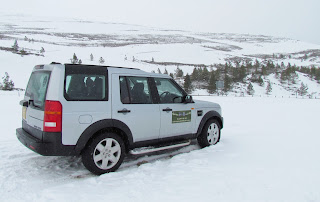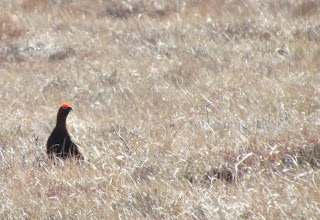March 2013 started cold but cloudy and dry in this area, then turned snowy mid-month, returning to very cold and sunny at the end of the month, with record low Easter temperatures , at minus 13c! With no real extremes of weather however, it was a very good month for safaris, and with a few early migrant birds arriving, these , added to our resident species, and lingering winter visitors, helped bird day-lists creep up into the 40's , with mammal lists steady at 6-9 species. The days are stretching out a bit now, and it needs an early (5 or 6 am) start to give you a decent chance of seeing the 'dawn' species such as Capercaillie and Black grouse.
Wildlife highlights included:
Local speciality bird species seen regularly included: Capercaillie, Black Grouse, Red Grouse, Dipper, Crested Tit, Goldeneye and Golden Eagle, with Black-Throated Diver, Slavonian Grebe, and Osprey all being spotted for the first time this year as the month progressed....though Crossbills were hard to come by, with just a couple of views.
Mammals seen during the month included: Roe Deer, Red Deer, Reindeer, Rabbit, Brown Hare, Mountain Hare, Red Squirrel, Mountain Goat, Stoat and Bank Vole.
Though March should still really be considered winter this far north, a proper 'dawn chorus' can be enjoyed now - a very uplifting way to start the day....
Our local 'rogue' Capercaillie continued to show well, often displaying and calling, especially on cold, bright mornings - though it should be noted that as soon as evidence of 'lekking' with other birds was noted in late March - the site was declared 'out of bounds' to visitors until the end of May.....
Our local Black Grouse 'leks' saw the numbers of Blackcock increase, and a noticeable ramping-up of their displaying and aggression at first light , as peak 'lekking' season approaches....
...Whilst our local Red Grouse seemed to be continually calling, posturing and defending their territories all day long, making them nice and easy to see and photograph on the moors....(see pic)
Wader species continued to flood into Speyside, with Redshank, Curlew and Golden Plover joining the increasing numbers of Lapwings and Oystercatchers.
The cold weather, and lack of natural food, meant that Crested Tits continued to come to feeding stations in our local Caledonian Forests, giving good photo opportunities (see pic)
Golden Eagles were seen well quite regularly, with one amazing day giving us not one, not two, but three birds flying and displaying, sometimes together, a fantastic sight! (see pic)
A Goshawk was a good 'year-tick' , in a local forest, this very powerful and agile bird seen hunting through the trees causing much panic amongst the smaller birds!
The Snowy Owl near the summit of Ben Macdui - the Cairngorms highest peak - continued to attract 'twitchers' - though the very difficult to access location and wintry weather prevented all but the most experienced mountaineer birders from getting anywhere near this much sought-after 'tick'....
A Black-Throated Diver back on territory on March 14th was a very early record (see pic) - though he soon had to vacate the loch as it shortly froze over again....
Our 'winter-white' species ( Ptarmigan, Stoat, Mountain Hare) were all very popular sightings, though their previously pristine white outfits were beginning to change to their mottled spring colours.
Crossbills were generally elusive throughout the month, though we did manage a couple of decent sightings, and it should be noted that being able to identify their calls is very important in detecting these birds...
The last week of the month saw the return to nest sites of some of our Ospreys, including the much-loved 'EJ' at Loch Garten RSPB reserve - a pretty impressive 'first summer migrant' tick for many of my safari clients! (see pic)
We are now entering my favourite time of year as a safari guide, with the winter weather hopefully coming to an end, the days lengthening, and all our breeding species appearing - magic!

|

|










